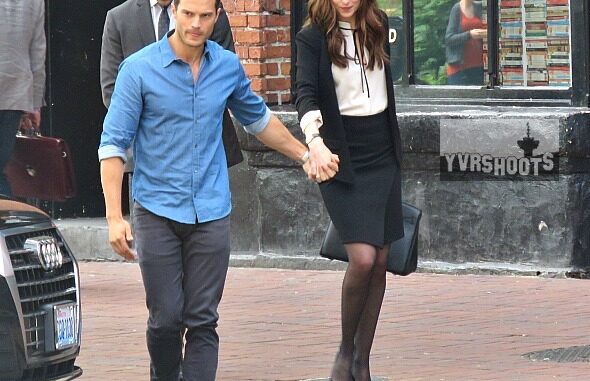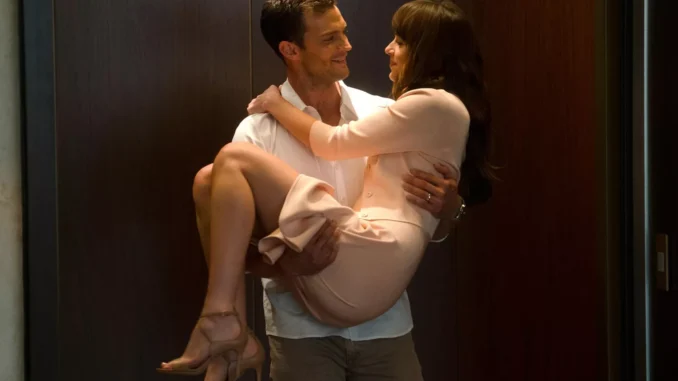
19 lingering questions about Fifty Shades Freed

The third movie in the Fifty Shades saga—really, this is a saga—comes out February 9, just in time for ironic Valentine’s Day plans. Thus, I—an entertainment writer and self-respecting lover of terrible movies—have decided it’s high time to finally watch them, taking on Fifty Shades of Grey and Fifty Shades Darker in the weeks before the finale comes to theaters so that I’ll be ready when things finally… climax.
Well, I’ve done it. Over the course of three weeks, a trial as emotionally and physically arduous as anything the young Anastasia Steele faced in the loathe-yet-magnetic red room, I have watched all three movies in the Fifty Shades trilogy. I now know Dakota Johnson’s naked breasts and Jamie Dornan’s blank, empty face as well as I know my own two hands, and I’ve fully grasped what I can only assume to be the thesis of this franchise: Rich people don’t have real problems, and capitalism is a broken system which will continue to exploit the working class and reward the unremarkable until we see full-scale economic revolution. The real domination is not Christian Grey’s feeble use of a riding crop, but rather the way he has consigned his employees to a life of meager deference, kowtowing to his 22-year-old bride who gleefully watches all of her dreams spread out before her like ripe fruit on a platter, waiting for her to thoughtlessly pluck up into her manicured fingers and pop into her mouth.
:max_bytes(150000):strip_icc():format(webp)/50-shades-of-grey-2000-5d2d281af813477cb5b9ccd3c5db3d9d.jpg)
Fifty Shades Freed finds Anastasia and Christian getting married and going on a whirlwind European honeymoon that we, as the audience, infuriatingly only see in montage-snippets. (What is the point of this wealth-porn if we cannot vicariously plan a lavish wedding celebration? A wall of flowers isn’t going to cut it; we’ve already seen that on Kim K’s Instagram.) Ana returns home to find that in her absence, she, a 22-year-old who had just months ago graduated college and began work as an assistant, is now the senior acquisitions editor at a major publishing company. How lucky! She and her handsome new husband kiss and have sex and buy a house and escape the sinister Jack Hyde, Ana’s former boss who’s become obsessed with destroying their lives.
In a haphazard third act, Hyde kidnaps Christian’s sister and forces Ana to bring ransom. Ana briefly becomes Jason Bourne, and Hyde is defeated. Also, Ana is pregnant, and though Christian had previously thrown a fit about it, now he’s decided he’s happy about it.
This movie is only about an hour and a half, but it feels as though it lasted for 5,000 years. Whether to blame the source material, the directing, the editing, or the actors (Johnson is a delight, Dornan is a corpse warmed up) is an unnecessary conversation. With Fifty Shades Freed, we are the ones who have all been freed. (Dakota Johnson presumably popped the champagne.)
But of course, there are still lingering questions, questions like:
How does Ana not know that Christian owns a plane?
After Ana and Christian drive away from their wedding, their chauffeured car brings them to a runway with a private jet. “You own this?” Ana asks, incredulous. “We own this,” Christian magnanimously corrects her. But… how does that surprise Ana at all? In the last movie, Christian mentioned buying an airline. An AIRLINE! More than a single plane! He has brought her on planes before, not to mention a personal helicopter emblazoned with the Grey logo. How does she need clarification about whether or not he might be wealthy enough to own a plane after being with him this long?
They kept Danny Elfman around, huh?

He has done the music for all three of these movies! Good on you, Danny Elfman!
How does Christian think a charm bracelet is a good gift?
Christian is set up as a paradigm of wealth and sophistication, and yet on their honeymoon, he gifts his new bride a charm bracelet. And a charm bracelet with an Eiffel Tower charm, which is the most infuriatingly and hilariously basic gift in the world. A charm bracelet is what a stepdad gives to his wife’s 13-year-old daughter who he doesn’t know all that well. It is clear from the fact that she never wears this bracelet again for the rest of the movie that Ana understands this.
How does Jack Hyde have the sophisticated hacking know-how to break into a tech company?
Jack Hyde was a fiction editor at an independent press in Seattle. There are a lot of skills that go along with being a fiction editor—speed-reading, attention to detail, contract negotiating, market awareness, conversational ability—but nothing in that role would give him the ability to hack into a company Ocean’s Eleven-style to retrieve top-secret data. Grey Industries is a technology company. And presumably, they have a basic security setup. Yet somehow, a middle-aged literary professional is able to hack—literally hack, using all of a movie’s “hacking” visuals—into its mainframe or data center or whatever. See? I’m a
writer; I don’t know these things.
Do we seriously not get any male nudity in this trilogy?
We see Anastasia topless so many times this movie, and not once do we get full-frontal nudity on Christian’s part. This is supposed to be groundbreaking (sorry, coughed a little bit on my tongue there) erotica focused on female pleasure. The audience of these movies are overwhelming female; and so why is it almost exclusively Ana we see as a sexual object and not the man we’re all presumably supposed to be thinking about when we return home to our showerheads?
How did Anastasia get promoted while she was on her honeymoon?
Literally, how is this office run? We haven’t seen Anastasia do anything to merit a promotion. Last film, we saw her ludicrously get promoted from assistant to fiction editor because she suggested in a meeting that they pay attention to writers with an online presence (?) and now she returns from a months-long vacation to find out her title is even more prestigious? Everyone should hate Anastasia. She is everything wrong with publishing, an industry that is frequently—and apparently more than justly—accused of catering to only the privileged and nepotistically rewarded.
Why is Purgatory the first book in the “Inferno” series?
:max_bytes(150000):strip_icc()/2475_fpf_00067r-2000-da41490f985945aebf8088dc4b3463ee.jpg)
The one thing we see Ana do at her job is publish a book by the young and attractive writer Boyce Fox called Purgatory. We see from its cover that it is the first in a trilogy. But… why would the first book in an “Inferno” trilogy be called Purgatory? The Divine Comedy is already a trilogy: It begins with Inferno, followed by Purgatorio, and then Paradiso. Why is he starting in the middle? What are these books? By which internal system is he operating?
And why is Ana so obsessed with Dante’s Inferno? Is it the only book she’s ever read? In the previous movie, she keeps suggesting this one manuscript that she says has great parallels to Inferno. It feels kind of weird that she keeps bringing it up.
Why doesn’t anyone in this office have a computer?
How the hell are people working at a book publishing company without computers? This isn’t 1925; Ernest Hemingway isn’t sending physical copies of typewritten manuscripts to the office. Authors write on computers. Editors edit on computers. Who wouldn’t know that?
If Christian is so jealous, why would he hire her such a hot bodyguard?
Because Jack Hyde was able to steal personal files, Christian ramps up security on Ana and the rest of his family. He hires his bride two full-time security agents, including one named Sawyer whose single defining characteristic is being hot, something everyone comments on. Sleeping with a bodyguard is a cliché, and Christian gets jealous of everyone. Why would he have been okay with that?
What is Christian doing in Africa?

Christian buys Ana a house, and he hires the flirtatious architect Gia Matteo to redesign it, and she hits on Christian with the perfect line: “I love what you’re doing in Africa.” That pickup line should be in books. It should be taught in comedy classes around the country. There is no joke anyone could write that would be more hilarious to me than the way this woman earnestly says, “I love what you’re doing in Africa.”
How is Ana such a good driver?
As they’re driving away from someone on their tail, Ana goes full 007 in an Audi. I realize that this is a movie but… again, how? Until she met Christian, she drove a beat-up old car, and since meeting Christian, it seems like she’s been mostly driven around by Taylor. How does she know how to pull these insane, stunt-driver style maneuvers? I thought she was supposed to be a virginal audience stand-in.
Why would anyone ever propose in a club?
Christian’s brother is dating Ana’s best friend Kate, and while it seemed like he was cheating on her—surprise—he was actually just about to propose. But why—and how—would anyone ever propose in a club?! Clubs are loud and crowded, and Christian’s brother, Elliot, is able to give a little impassioned speech about finding love. Did he shout it over the music? Because there is music in this club—they dance about five minutes after she accepts. But proposing in a club just seems logistically difficult and also terrible.
Why is Jack Hyde’s biographical information the best the investigators could do?
We know that Christian loves researching people; he had files on all of his prospective subs, including Ana. And when he found out Jack Hyde broke into his company, he sent private investigators to find out everything they could about him. They came back telling Christian that he went to Princeton and worked at a few other publishing companies before the one in Seattle. Really? That was the result of their exhaustive investigation. And they present that information to Christian like they’re really proud of it, like it’s urgent news that he needs to know. That’s all stuff you could find on a quick Google search. It’s probably on his public LinkedIn page.
